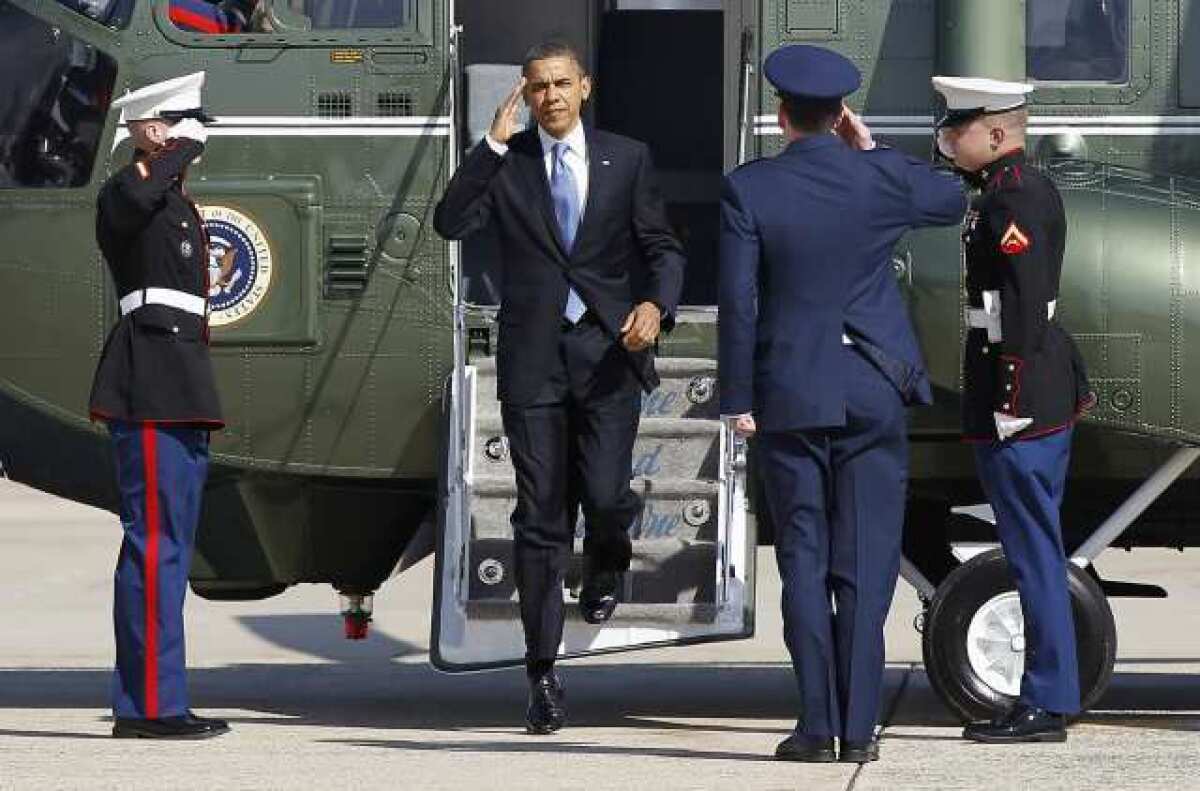Goldberg: Obama’s problem? His record

- Share via
“The choice in this election is between an economy that produces a growing middle class and that gives people a chance to get ahead and their kids a chance to get ahead, and an economy that continues down the road we are on, where a fewer and fewer number of people do very well and everybody else is running faster and faster just to keep pace.”
That’s Obama advisor David Axelrod on “Fox News Sunday,” explaining why people should vote for … Barack Obama.
Odds are this was simply poor phrasing. But it might not have been, given how desperately the Obama campaign wants to turn the clock back to 2008, when the choice was between hope and change or continuing “down the road we are on.”
COMMENTARY AND ANALYSIS: Presidential Election 2012
Regardless of the spin, the simple fact is that Obama is the stay-the-course candidate stuck with a team, a record and an economy ill-suited for a stay-the-course strategy.
That’s what gives poignancy to Obama’s recently renewed love affair with Ronald Reagan, whom Obama invokes these days as a model of reasonableness and bipartisanship. He even wants to rename the “Buffett rule” the “Reagan rule.”
Even before he got the nomination in 2008, Obama said he wanted to be a “transformative” president like Reagan had been.
And last year, Time magazine featured a cover story, “Why Obama [Hearts] Reagan,” which in Time’s words gave the true story behind “Obama’s Reagan Bromance.”
There were two key elements to Obama’s man-crush. The first was the simple hope that history — or at least the business cycle — would repeat itself.
The White House’s plan was to run for reelection in 2012 with a soaring economy at its back. After an absolutely bruising recession (that was in some ways worse than the one Obama inherited), Reagan got to ride a surging economy to reelection. America enjoyed 6% annual growth in 1984: In three of the four quarters before election day, GDP quarterly growth was more than 7%, while inflation and unemployment plummeted.
At Obama’s back is a dismayingly anemic recovery, constantly threatening to get worse. He wants credit for “creating” 3 million jobs but insists he be held blameless for millions more workers who’ve left the job market entirely.
The other reason the White House admired the Reagan White House? According to Time: “Both relied heavily on the power of oratory.” Then-Press Secretary Robert Gibbs added, “Our hope is the story ends the same way.”
And there’s the problem for Obama. He’s sticking to his rhetorical guns on the assumption that he’s the great orator his fans have always claimed. It’s admirably Gipperesque, I suppose, but the problem is that Obama has never once significantly moved public opinion on domestic issues with his arguments. If he had that power, not only would “Obamacare” be popular today, it would have been popular when he gave more than 50 addresses and speeches on it during his first year.
Obama’s out on the stump, embracing Obamacare, doubling down on green energy, on the need for “investments” in government programs, and for the whole hodgepodge of rationalizations for hiking taxes and “spreading the wealth around.”
Asking whether Obama is as good a communicator as Reagan is like comparing boxers from different generations; there’s plenty of evidence to form opinions but no way to settle the matter.
But what must be very troubling for Obama is the mounting evidence that presidential persuasion is vastly overrated. Political scientist Brendan Nyhan has noted that Reagan’s rhetoric had little effect on the polls or his media coverage. Liberal Washington Post blogger Ezra Klein, surveying the academic literature in a recent issue of the New Yorker, found that there’s little evidence that any president has really moved the country with his rhetoric.
My hunch is that such findings are overdone and leave out some aspects of presidential persuasion.
Still, what’s undoubtedly true is that results matter far more than words. And despite Axelrod’s assertions, the fact is that Obama has been leading us down the road we are on for more than three years, and that’s what voters will have in mind come election day.
More to Read
Sign up for Essential California
The most important California stories and recommendations in your inbox every morning.
You may occasionally receive promotional content from the Los Angeles Times.











